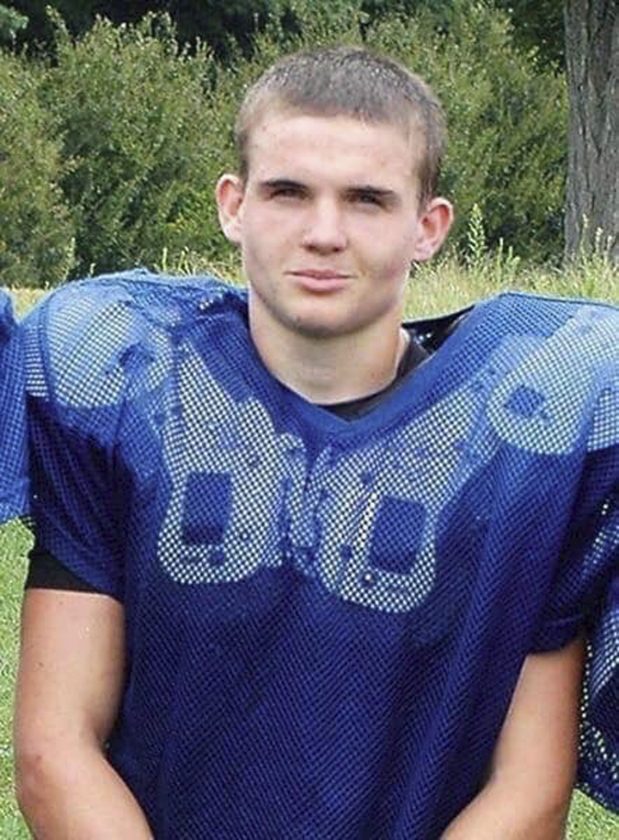
Damon Janes was a junior at Brocton High School in 2013 when he suffered a fatal head injury during a Westfield-Brocton football game.
<!–
BROCTON — Ten years ago, during a football game between Westfield-Brocton and Portville, the way many people view high school sports across Western New York was changed forever.
Damon Janes, a junior running back from Brocton, suffered a head injury during a game in September of 2013. Janes lost consciousness and was transported to a hospital. Three days later, in a Buffalo hospital, Janes died at the age of 16.
Horrifyingly, the tragedy that took Janes’ life was not unique. According to the National Center for Catastrophic Sport Injury Research at the University of North Carolina, Janes was one of eight players whose deaths were directly related to high school football in 2013. Multiple others died that year from indirect causes, such as a heat stroke or sudden cardiac arrest, tied to exertion in general, but not unique to football.
Janes’ mother, Penny Gilbert, believes “firmly and wholeheartedly” that injury prevention and management needs to be addressed on a large scale. However, after years of speaking to the importance of the topic, Gilbert has become “tired of speaking to deaf ears.”
Advancements in safety have been seen throughout the sport of football in the decade since Janes’ death, including increased education on identifying traumatic brain injuries, a national coaching focus on proper tackling techniques from USA Football, and safer helmets implemented at many levels across the nation. But with the nature of a contact sport such as football, serious injury risks will always be attached.
“Unnecessary injuries aren’t going to go away. I’ve said it plenty,” Gilbert said. She stated that people “chalk it up” as comments from a grieving parent or justify their decision to let their children play sports by viewing what happened to Damon Janes as a “freak accident.”
“They truly lack a full understanding that their children may not come home,” Gilbert said.
Despite those risks, Gilbert does not want to see opportunities through sports be taken away from kids. Even though the tragedy of losing a son, Gilbert sees the benefits to sports for children.
“The last thing I’d ever like to see are sports taken away. It builds so much structure, self-esteem, unity, comradeship, and teamwork,” Gilbert said. “They stay active and fit. It builds character, commitment, and in some cases, a sense of belonging.”
What Gilbert does want to see is an increased investment into safety in youth athletics, including the addition of athletic trainers and newer, safer equipment. In doing so, Gilbert believes the investment will benefit student-athletes not only during competition, but also away from the game.
“Athleticism goes hand in hand with academics. Many children get full scholarships to colleges to further their education from sports. It’s time to stop shortchanging the funding for it. It’s been time … it’s way overdue,” Gilbert said. “Lacking funding and broken politics in schools get broken children in our future.”
Gilbert and Janes’ family sued multiple school districts after his untimely death because they claimed his death was preventable. Some of the issues that presented themselves a decade ago at Janes’ tragic death remain, most notably, the lack of athletic trainers at many sporting events across Western New York.
“All schools should be provided the financial support to fund these extra-curricular activities,” Gilbert said. “… The time to throw money to the well-being of our rural youth is now.”
At a recent Board of Education meeting at Fredonia Central School, after multiple injuries were sustained in a Fredonia football game, Fredonia resident Marie Persch spoke about the risks to players in high school sports. Persch, a Brocton teacher, was the Athletic Director at Brocton Central School when Janes died.
“I can tell you from personal experience that it will be very difficult for you to personally recover from a child that doesn’t come back,” Persch said to the Fredonia Board of Education, referring to Janes’ death as she fought back tears.
Also speaking that night was Susan Johnson, a Fredonia parent whose son sustained a concussion during a game. She noted the district’s concussion management policy was not available online to view. In the weeks since, the policy was updated and posted for the public.
“I commend the ladies who spoke up in Fredonia. I hope they can make a difference,” Gilbert said. “Although, I’m not holding my breath.”
